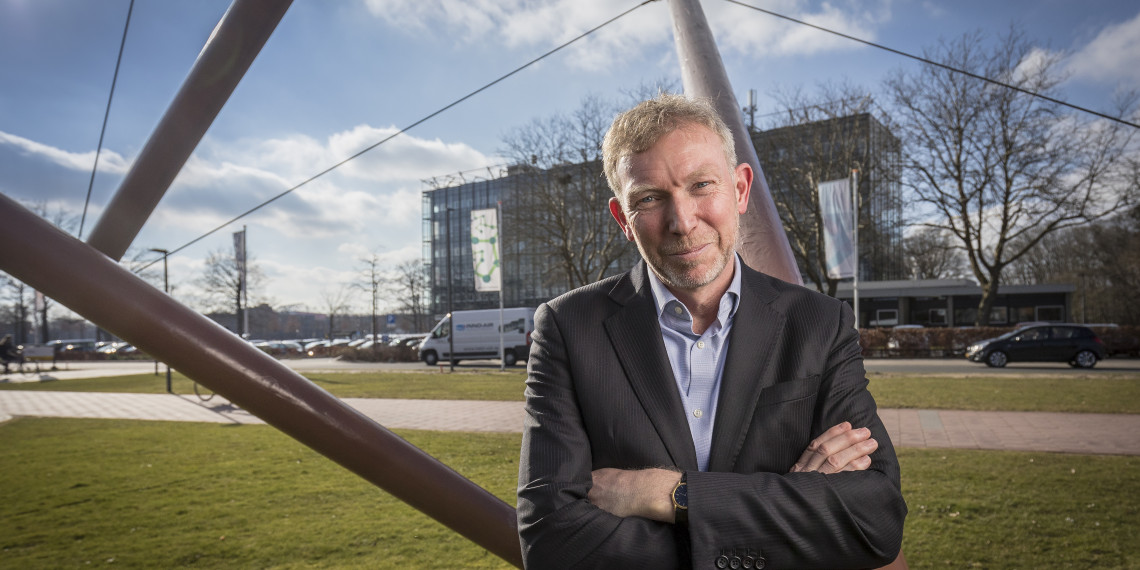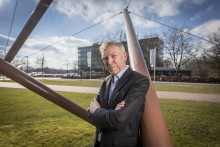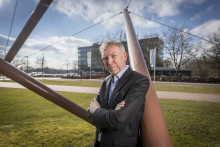‘It feels like the time I have spent here is ending with a whimper,’ Victor van der Chijs says with a sigh during his final week as chairman of the board. ‘I would very much have loved to end things together with my colleagues and I wanted to leave with a bang. During my first month as chairman of the UT's executive board, I said I would throw a massive party for all students and staff when I left. We would all get together to have a great time at the Ganzenveld. That sounds so much better than a dull symposium.’
Van der Chijs even had a main act in mind. ‘Have you ever heard of George McCrae? He's an American soul singer who scored a hit in the 70s with Rock Your Baby. During a Top 2000 broadcast, I was surprised to learn that he lives in the Netherlands. I immediately made a mental note: We have to invite McCrae to my final party.’
An American soul singer making fifteen thousand UT students and staff go wild under a warm spring sun: it is a wonderful picture, but the chairman understands perfectly well that the corona crisis has made this absolutely impossible. ‘I sometimes wonder how we will look back on all this two years from now. Some of the things we are doing now - or not doing - may turn out to be completely ridiculous in hindsight. I say that without judgement; it is certainly not my intention to question the government's measures.’
'I was suddenly no longer able to rely on my intuition'
As chairman of the executive board, Van der Chijs has felt ‘seriously handicapped’ this past year because of the lack of physical interaction. ‘I am an intuitive administrator. I look at people's body language and listen carefully to what is being said around the coffee machine. That is simply not possible via a webcam. I was suddenly no longer able to rely on my intuition. I had to take action. I started coming to campus more often and will sometimes call colleagues up unannounced, just to get a feel for what is going on.’
Ambition
‘These are strange times,’ the departing chairman concludes. On a bench on the shore of the Horstvijver, he looks back on his eight years at the University of Twente. After a career spent working at ING, Schiphol and the architectural firm OMA, among other places, his UT adventure began in 2013. ‘It's okay if your ambition hurts a little,’ he tells UT-Nieuws (the predecessor of U-Today) during his first interview as chairman of the board. ‘If you truly aspire to being an excellent organisation that claims its place in the system, everyone has to give it their all,’ he continued.
The past eight years have done nothing to change Van der Chijs's mind on the matter. ‘I believe that is the standard the UT sets for itself. I do say this with mixed feelings. Yes, ambition can hurt a little, but one of the biggest issues in the academic world is the high workload. Still, as a relatively small university, we have to set lofty goals for ourselves to stay relevant. We are located far outside the centre of power in the Netherlands and the focus of the media. The UT will always have to be a little bit smarter, faster and better than everyone else. I don't know many people at the UT who would say that they don't really care. Staff and students are incredibly involved with the UT. No one wants to work or study at a mediocre university.’
'I don't believe there is such a thing as an all-knowing chairman. I am a firm believer in collective intelligence and test, weighing and trying out the best solution together'
Although he believes people at the UT are committed and ambitious, he also thinks they can afford to be a bit more vocal about their achievements. ‘In part, that stems from local nature. People here tend to be reluctant to make claims. The same goes for scientists in general. However, if you want to acquire funding and bring in new projects, you have to make claims and draw attention to yourself. That is why we tried to improve the UT's visibility these past few years. It is also the reason why we founded Strategic Business Development (SBD). SBD's job is to constantly knock on the doors of governments, businesses and consortia to acquire projects and funding. I am convinced that SBD will have a significant impact on our indirect government funding and commercial funding. They will put us in the spotlights.’

Photo: Victor van der Chijs at a New Year's meeting in 2015 (by Gijs van Ouwerkerk)
Proud
Van der Chijs believes DesignLab, which was established during his tenure as chairman, also plays a major role in the UT's visibility. ‘From the very beginning, DesignLab has been attracting incredible goodwill. It is trendy, hip and run almost entirely by students. I see it as the place where scientists descend from the Mount Olympus of the academic world, where abstract knowledge is translated into tangible solutions. That is also our primary task as a university. We want to make a positive impact on the world around us as quickly as possible. Following Twente's example, new DesignLabs are also appearing in Eindhoven, Delft and other university towns. That says enough, I think.’
DesignLab, the European consortium ECIU, the new vision Shaping 2030, the TechMed Centre, the partnership with the VU and the internationalisation: these are all projects that Van der Chijs looks back on with pride. The same goes for the student activism at the UT. The chairman was therefore surprised to read about the Protest Action Group, a group of students who feel dissatisfied with the UT's policies, which they claim make student activism impossible. ‘To be honest, these stories mostly annoyed me. I just don't get it; don't we have a good thing going here at the UT?’
'I was still trying to find my footing when I first started out as chairman'
‘Student activism is what makes our university unique,’ Van der Chijs continues. ‘Students make a deliberate choice to come to Twente. That results in a unique atmosphere on campus and a unique type of student. Recently, I spoke with the prime minster of the Dutch student cabinet again: Timon Metz. I wish I had been like him when I was his age. So clever, straight forward and smart. That is the kind of student you want to ‘produce’ as a university. They are the leaders of the future and we have quite a few of them here at the UT.’
Disappointments
Van der Chijs has a long list of things he is proud of. On the other hand, his list of disappointments is markedly shorter. The research campus led by UT alumnus Kees Koolen - which was announced in 2018 with a jubilant press conference and which ultimately did not come to fruition, is not on the chairman's list. ‘It was little more than a setback. That's all part of entrepreneurship. It certainly didn't keep me up at night. What's more, some wonderful things are happening at the UT in the field of energy under the guidance of Jos Keurentjes.’
A much bigger disappointment, Van der Chijs says, was the failed Technology Agreement: a comprehensive investment programme in which the government, employer and employee organisations, social organisations and knowledge institutions would work together to develop a long-term strategy. As chairman of the 4TU, Van der Chijs was a strong advocate of this agreement. ‘Knowledge is our country's most important resource. Nevertheless, the Netherlands is dangerously dependent on technology sourced from elsewhere in the world. Take the corona pandemic, for example. The Netherlands - and perhaps Europe as a whole - is lagging behind the rest of the world. We have to continue making our future in the Netherlands. The only way to do that is by having a long-term vision on technology. Everyone I spoke with in The Hague agreed with me, but nothing came of it in the end. That bums me out. Now we have no choice but to reinvent the wheel all over again every four years when the new cabinet is formed.’

Photo: Victor van der Chijs in a get-together with the former rector of the University of Groningen, Elmer Sterken, during the Batavierenrace in 2019 (by Frans Nikkels)
Passer-by
Van der Chijs pauses. He grabs his tablet with his notes. ‘I do want to stress that everything I have mentioned has been a collective effort. I'm honoured to be giving this interview, but there will soon be someone else to play my role. The UT just keeps on going. I don't believe there is such a thing as an all-knowing chairman. I am a firm believer in collective intelligence and test, weighing and trying out the best solution together. At the university, the Executive Board and Strategisch Beraad do this together with the University Council. Over the years, I have come to appreciate this interplay and the process of making the right decisions together.’
Entrepreneurship
The way decisions are made at the university contrasts with how this is done in business, Van der Chijs knows. During his time at ING, Schiphol and OMA, he became accustomed to a top-down management structure. ‘There is less time in business. At some point, you simply have to make a decision. You are expected to. It either works out well or it doesn't.’ Van der Chijs believes universities can learn a thing or two from the pace at which businesses operate. ‘They need to learn fast: universities are competing more and more with businesses, especially in the field of education. In business, a lead time of three months to make a decision is absolutely unthinkable.’
'We must constantly prove just how good we are as a university, because our position is certainly not a given'
By appointing Van der Chijs, the UT brought in a true entrepreneur. ‘It was actually an atypical choice - for me as well. Sometimes, you have to step out of your comfort zone. Beyond my own time as a student, I was not familiar with the academic world. Recently, I have been having some reflective discussions with colleagues. They noticed that I was still trying to find my footing when I first started out as chairman. I wondered what I could do to make a difference. That doesn't bother me as much anymore. When you know what you have to do, you are less afraid of making mistakes. You get to loosen up a bit. I try my best, but I am far from infallible.’ He smiles. ‘I have gotten a bit older, too. Age makes you more comfortable with the things you cannot do.’
Future
In early April, Van der Chijs will leave the UT for Deltalinqs, the entrepreneurs organisation for ports and industrial enterprises in Rotterdam. In his own words, he is departing a university that is ‘in excellent condition.’ Nevertheless, the departing chairman states, the UT will have to keep its eye on the ball. ‘We must constantly prove just how good we are as a university, because our position is certainly not a given. As I said earlier: the UT must show drive and ambition. That is what I have done my best to contribute to these past years.’








